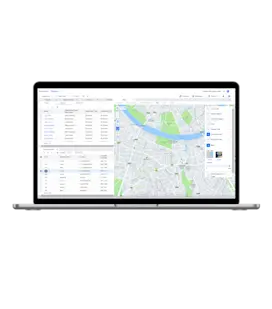Routing and Scheduling Software: Where the Savings Come From
Routing and Scheduling Software: Where the Savings Come From
Routing and Scheduling Software: Where the Savings Come From
15 Oct 2020
Jim Endres
Implementing advanced routing and scheduling software can save you 10-30% in delivery transportation costs.
Let’s give that a moment to sink in. 10-30%. Depending on the size of your enterprise, those numbers could be astronomical. Who wouldn’t want to put 10-30% of expenditures right back into their pocket?
But where do those savings actually come from?
It’s not just from one place, it’s not just from one employee, from one process.
It’s from making small and consistent cost-saving decisions based on hard data. It’s from the numbers that your advanced routing and scheduling software gives you that you can then make confident decisions. It’s in optimizing your resources, in improving driver retention and avoiding fines, it’s in every aspect of your business.
Here's a breakdown of how you can can grow your bottom line.
Optimize Use of All Resources, Including Drivers, Vehicles and Fuel
Routing and scheduling software uses computer algorithms to work out how to complete the maximum number of deliveries on time, using the minimum time and miles driven. And we don’t need to tell you that reduced time and miles equal lower fuel and driver costs.
Areas for savings include:
Reduced driver-hours. Suppose you have 50 drivers working the maximum 70 hours allowed under hours-of-service (HoS) restrictions per week — each earning an average of $19.85 per hour. That's nearly $60,000 in overhead each week. Even with a modest reduction in driver hours of 10%, you could be saving more than $350,000 per year. Alternatively, you can take on more work without increasing the number of drivers.
Fewer trucks. The average new Class 8 truck was sold at $117,430 in 2018, according to Statista.com. So, how much does it cost to put a new delivery truck on the road? Just one new tractor/trailer combo, which will run for an estimated five years, can cost about $160,000. If you can reduce a 50-truck fleet by 20%, you're looking at savings of $1.6 million over that period.
Reduced maintenance and fuel costs. These costs go down as the number of trucks and miles needed for completing deliveries decreases. The American Transportation Research Institute (ATRI) calculates the average cost of a truck mile at $1.82. If you know your annual fleet miles, a simple calculation will show you how much you'll save if you trim 10% or more from your current miles driven.
And the Savings Don't Stop There
Some of the benefits of routing and scheduling software that go straight to the bottom line may not seem obvious.
Let’s explore some of the lesser known ways you can save:
Improve driver retention. Truck drivers are increasingly being persuaded to switch firms, and the average cost of hiring a new driver is $8,200, according to TheTruckersReport.com. Drivers often leave because of what they perceive as unfair route allocations that strand them far from home at the end of a shift or leave them stuck at an overcrowded delivery site earning nothing. When you generate routes using routing and scheduling software algorithms, you can be sure that route allocation is fair, achievable and unbiased. The automated software considers drivers' vacation, medical appointments and even their preferences regarding where they end a shift. All of this makes drivers feel valued, happier and less likely to leave.
Avoid fines. Routing and scheduling software aids in compliance with hours-of-service rules for drivers. These are now measured with mandatory electronic logging devices (ELDs) and strictly enforced. The average fine for violating the daily driving limit is $7,322, and exceeding the weekly limit is typically $4,787, according to KeepTruckin.com. These costs should be eliminated with reliably accurate route plans that keep drivers within their HoS limits.
Reduce planning costs. Route planning done without routing and scheduling software takes a lot longer. The difference is typically hours compared to minutes using this technology. The software also offers the opportunity to centralize route planning instead of spreading it across multiple distribution centers. One large home improvement retailer was using part-time route planners to dispatch trucks in each of its 80 stores. After the company automated and centralized planning, only two people were needed to complete all route planning work across the network. The average route planner earns an annual salary of $44,877, according to Glassdoor.com. Once the software crunches and calculates the myriad route possibilities, many of our customers redeploy planners to do what humans do best—solve problems and look for strategic improvements, generating other savings.
Reduce incoming customer service inquiries. With routing and scheduling software improving your on-time delivery performance, you'll be handling fewer incoming customer service queries than you currently do. A typical "where is my order?" call to customer service costs $7–$13 per interaction. Add in the ability to proactively send customers ETA messages via email or SMS, or even allow customers to track a driver in real time via an electronic proof of delivery system, and you can expect to see customer service queries drop by 50% or more. These savings go straight to the bottom line. There are clear financial benefits to improving customer service, not least that acquiring a new customer can cost five times more than retaining an existing customer. Increasing customer retention by 5% can increase profits from 25-95%, according to OutboundEngine.com.
Endless Benefits of Aptean Routing & Scheduling Software
Routing and scheduling software is the gift that keeps on giving. Truly. The system gathers and utilizes detailed data about your delivery operations and performance, generating a positive and continuous feedback loop that leads to never-ending improvements in efficiency. The data also boosts the ability for businesses to make better strategic decisions by asking what-if questions, for example, whether to take on a new customer or open or close a distribution center. These benefits, in addition to invisible ones we didn’t even have time to mention, add even more to the bottom-line results. You can transform delivery from a pure cost center into an engine of business excellence. And savings.
Are you ready to see savings of up to 30% across your transportation operation? Our industry-specific routing and scheduling software, Aptean Routing & Scheduling, can help. Find out how, now.
¿Todo listo para transformar tu negocio?
Tenemos las soluciones TMS especializadas que necesitas para superar los desafíos de tu sector.



